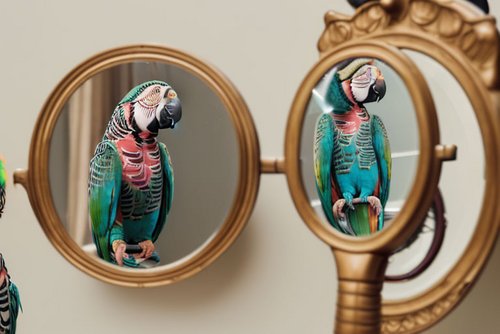2023 Long Night of Academic Writing explores the topic of artificial intelligence
»A night where the magic of writing unites with the mysteries of technology« – this is what this year’s Long Night of Academic Writing promises. Under the motto of »who is writing?«, the Bauhaus-Universität Weimar warmly invites to a night-time foray into the new world of writing from 5 pm on Thursday, 22 June 2023.
In an age when algorithmic text generators create poems, research tasks are completed in next to no time using search engines and chatbots express themselves with astonishing eloquence, the question poses itself of how writing is changing as a result of these technological developments. The ninth Long Night of Academic Writing offers a platform to reflect together on the challenges and opportunities that the »artificial« generation of knowledge and texts brings with it. Students, doctoral researchers, university staff and all others interested in writing are cordially invited to contribute their thoughts, experiences and ideas, and to reflect together on the future of writing.
Following the opening by President of the Bauhaus-Universität Weimar, Prof. Peter Benz, lecturers will share insights into their current courses in the first part of the evening: Jasper Cepl will speak with architect Benedict Tonon about the role writing can play as a design technique in architecture; Almut Nowack from the Department of Product Design will focus on storytelling in design portfolios; Moritz Wehrmann from the Faculty of Media will use tools in the AI course in English to boost creativity and provide a reflective lens for our own intelligence.
At 7 pm, the author and literary and cultural scholar Jenifer Becker will explore the question in her keynote address »Poetische Prozessoren« [»Poetic Processors«] of whether artificial intelligences write creatively? She will examine the possibilities, challenges and opportunities of automated text generation for creative writing processes, collaborative work with ChatGPT and co., but also the influences on the production and circulation of different texts such as guidebooks, children’s books and even academic texts. This will be followed by a discussion with her, Prof. Dr. Jan von Brevern from the Faculty of Architecture and Urbanism and Jonas Böddicker, who is a student within the Faculty of Media, about possible new ways of dealing with the »artificial« generation of knowledge and texts. The discussion will be moderated by Diego León-Villagrá from the media anthropology research training group.
In the third part of the evening, all participants will then have the opportunity to try out various AI tools for themselves during workshops in German or English: The AI Writing Lab will critically examine texts generated using AI to develop academic writing skills. Jenifer Becker will draw on different text forms to explore collaborative processes in creative writing, refine prompts and examine different ways of conceptualisation that may potentially lead to more substantial texts.
The Language Centre’s »Naturally intelligent vs. artificially intelligent« programme focuses on writing in different languages. Together with Kathrin Zeidler and Manja Gerlach, those interested can compare artificial and self-written texts in German and English. In the exhibition »Meine Katze hat gepupst« [»My cat farted«], Urs Urban and Hélene Dal Farra will demonstrate the possibilities and limitations of AI text generators in dealing with cultural references. Finally, all teaching staff are invited to then take a look at the future development of teaching and learning in »AI vs. U«, moderated by Ronny Schüler.
In parallel to the events on algorithmic text generators, there will also be general offers on research, writing and publishing. The student readings form one special highlight: During the »Open Mic« session, students will read their own lyrical, prose and experimental texts late in the evening. To accompany the exhibition »Gefesselte Blicke – Filmplakate aus den 1920er Jahren« [»Captivated Glances – Film Posters from the 1920s«], students will first turn the film posters on display into an audio experience. The exhibition focuses on aspects that address gender relations of this era – images of women are shown ranging from the fashionable »lady with mask« to the pitiful »foundling bird«. The exhibition was created in a cooperation between Dr. Simon Frisch from the Faculty of Media and Prof. Dr. Patrick Rössler from the University of Erfurt together with their local university libraries. The project helps to ensure that this heritage of European film culture remains firmly anchored in our society’s collective memory.
Finally, the university library team will complement the programme with a series of entertaining workshops: Dana Horch will inform on Open Access publishing, Kevin Lang will share insights into the description of research data in codebooks and readme files, and Jana Schröder, and Christina Kleffel will advise on research in architecture, urbanism and civil engineering. There will of course also be guided tours of the library’s closed stacks again with Christiane Tampe and Jörg Köditz, which will take you into the area of the university library that is otherwise hidden from the public and also somewhat mysterious.
Small diversions and refreshments will be provided in between. Participation in all events during the Long Night of Academic Writing is free both for members of the Bauhaus-Universität Weimar and for guests. Due to the limited places, registration for the workshops is recommended. For the full programme and information on how to register, see: https://www.uni-weimar.de/en/university/news/annual-events/annual-events-2023/long-night/
Long Night of Academic Writing
22 June 2022 | 5 pm to midnight
University Library at the Bauhaus-Universität Weimar
Steubenstrasse 6, 99423 Weimar
In case of questions, do not hesitate to contact Dr. Franziska Matthes, Bauhaus Research School (franziska.matthes[at]uni-weimar.de; +49 (0) 3643/58 41 05) or Dr. Katrin Richter, University Library (katrin.richter[at]uni-weimar.de; +49 (0) 3643/58 28 03).


